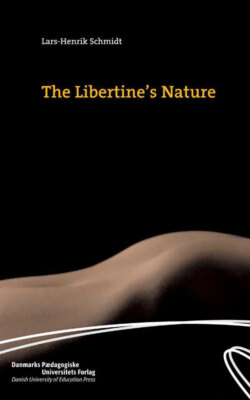Читать книгу The Libertine's Nature - Lars-Henrik Schmidt - Страница 12
На сайте Литреса книга снята с продажи.
Sade’s Craving
ОглавлениеIt is the actual articulatory relationship we call craving. It is craving that is articulated as need or desire but which is not need or desire. The thesis is, then, that we can use Sade in a speculative attempt to develop a third track. Sade himself thinks in terms of the opposition between need and desire, but his praxis, both the libertine and the literary, cannot actually be contained in this problematic. Consequently, Sade is worth a closer look.
With Sade as a fellow player a problematic can be constructed that neither subscribes to the constellation need-necessity-satisfaction-system-market nor to the constellation desire-happiness-fulfilment-reciprocity-exchange, but rather to the following constellation: craving-pleasure-acting out-commoneness-taking.
The acting out of craving is experienced as pleasure. The source of pleasure belongs to the individual in his one-sidedness, where pleasure is taken at the expense of the other. The crux of the matter is to understand the implications of pleasure occurring at the expense of the other, who himself takes pleasure at a third person’s expense, who himself takes pleasure at a fourth person’s expense, and so on, but without the relations forming a synthesis, without them forming a system.
In Sade what this means is clear, but the issue that interests us is whether or not a contra-intentional possibility can be traced precisely in the will to reduce the other to an object of pleasure, also in Sade. Sade wants to but cannot (precisely because he wants to) accomplish his reduction.
Introducing the third constellation means then that a counterpart to prohibition and command must be introduced as well. This counterpart can be found in the offer, in the invitation to share commonness (which alludes to something more than communality and less than universality). When one shares commonness with someone, one abstains from turning this person into a pure object. One behaves with reserve because one does not long for the other, but one misses something else: the relation to the other, which means that one belongs to the difference to the other, and this is why one is a-miss. In the annihilation of the other, this difference, this missing, this reserve is lost, as the relation is broken off when the other exists in his or her self-dependence or self-sufficiency or even as nothing – it amounts to the same thing, since the other’s substantiation is the annihilation of reserve.
One cannot just take pleasure in the other; one must also take pleasure in the other’s pleasure. The other’s relation to himself, which involves me and my relation to myself, which involves…
Perhaps it is precisely because there are ways in which we cannot take pleasure in the other that we also take pleasure in the other’s pleasure: to make the other into a substitute is thus a social technique. To take pleasure in the other means that the other does not back out, in one way or another. This involves a diagnosis of craving (or a diagnosis of protest).
Abstention is then a necessity in but not a precondition for the social: it has a genesis but no origin; it is not caused or motivated but it derives from being a-miss. Its substitutional ground is the missing we cannot separate from life itself, from the inevitability of missing. Abstention is the superhistorical precondition for the social, for what I also call socius. In Social Analytics, socius is thus the name for the conjunction between conflictual commonness and common conflictuality, for the social coincidence.
